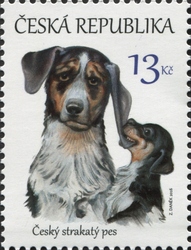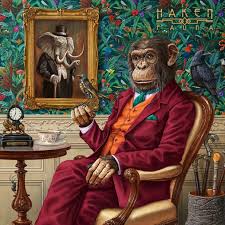Stamp: Czech Spotted Dog (Czech Republic 2016)
Czech Spotted Dog (Czech Republic 2016)
03 February (Czech Republic ) within release Puppies - Czech National Breeds of Dogs goes into circulation Stamp Czech Spotted Dog face value 13 Czech koruna
| Stamp Czech Spotted Dog in catalogues | |
|---|---|
| WADP Numbering System - WNS: | WAD:CZ003.16 |
Stamp is vertical format.
Also in the issue Puppies - Czech National Breeds of Dogs:
- Stamp - Czech Spotted Dog face value 13;
- Stamp - Czech Spotted Dog (Canis lupus familiaris) face value 13;
|
Data entry completed
80%
|
|
|---|---|
| Stamp Czech Spotted Dog in digits | |
| Country: | Czech Republic |
| Date: | 2016-02-03 |
| Size: | 26 x 36 |
| Perforation: | 12 by 12 |
| Format: | Stamp |
| Face Value: | 13 Czech koruna |
Stamp Czech Spotted Dog it reflects the thematic directions:
The domestic dog (Canis lupus familiaris or Canis familiaris) is a member of genus Canis (canines) that forms part of the wolf-like canids, and is the most widely abundant carnivore. The dog and the extant gray wolf are sister taxa, with modern wolves not closely related to the wolves that were first domesticated. The dog was the first domesticated species and has been selectively bred over millennia for various behaviors, sensory capabilities, and physical attributes. Their long association with humans has led dogs to be uniquely attuned to human behavior and they are able to thrive on a starch-rich diet that would be inadequate for other canid species. Dogs vary widely in shape, size and colours. Dogs perform many roles for people, such as hunting, herding, pulling loads, protection, assisting police and military, companionship and, more recently, aiding handicapped individuals. This influence on human society has given them the sobriquet "man's best friend".
Fauna (pl.: faunae or faunas) is all of the animal life present in a particular region or time. The corresponding terms for plants and fungi are flora and funga, respectively. Flora, fauna, funga and other forms of life are collectively referred to as biota. Zoologists and paleontologists use fauna to refer to a typical collection of animals found in a specific time or place, e.g. the "Sonoran Desert fauna" or the "Burgess Shale fauna". Paleontologists sometimes refer to a sequence of faunal stages, which is a series of rocks all containing similar fossils. The study of animals of a particular region is called faunistics.


